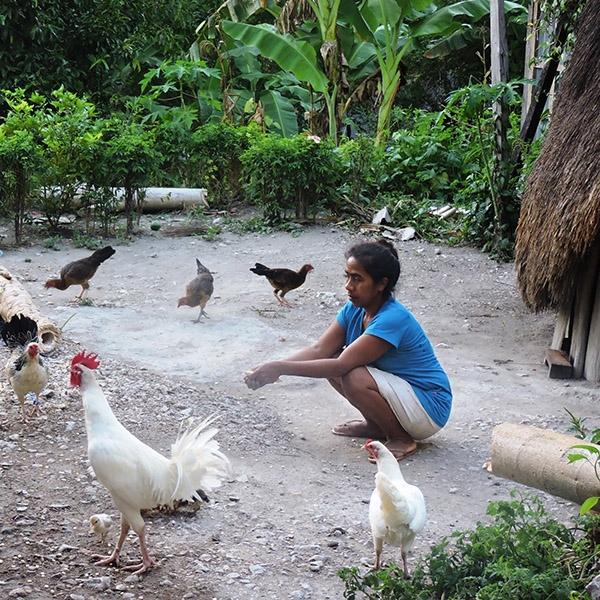Stories of Change

Esther feeds some of her chickens.
CWS efforts in Indonesia positively impacted more than 17,000 people in 16 communities this year.
Source: CWS Annual Report 2017
A second chance at a brighter future
Yosber Sae and Esther Kikhau have raised animals for years in the remote village of southeastern Indonesia where they live with their three children. They used to have pigs and chickens, but they didn’t have any formal training in animal husbandry. Their animals weren’t vaccinated and wandered freely, so most had died by the point that our team met the family.
When Yosber and Esther joined the CWS Timor Zero Hunger program, they had only four chickens left. Our team gave them a second chance – after the couple had learned about how to properly care for the animals, we gave them additional chickens.
Yosber says, “When CWS offered us chickens we were happy to accept them because we had a chance to learn how to raise them in a coop, which we made ourselves but with CWS staff guidance. Before, we let our chickens roam around unvaccinated – and maybe that’s why they died. But, along with coop-building, we learned about immunization and how to make sure the flock stays healthy. Slowly but surely our flock grew. Now, we have more than 70 chickens – and a lot has happened since we started with our own four chickens and the ones CWS gave us.”
In May 2016, Yosber and Esther sold four mature roosters and use the money to buy a pig. Once she had her first litter, the family sold three piglets for $64. They used the money to pay for their vocational high school for their oldest child, 18-year-old Riski.
With the support of donors like you, Yosber, Esther, their family and many others in Enonabuasa village have measurably better lives. Among other things, they have access to safe water. That means they can grow more (and more nutritious) vegetables – some to eat and some to sell. More people here now know more about the nutritional value of vegetables, chicken meat and eggs. Families have large enough flocks of chickens that they can afford to keep and eat some, rather than selling all of them. Families here eat eggs two or three times a week and are eating chicken meat with increasing regularity.
Esther says that the most important change she has seen is a newfound hope and a focus on planning ahead. “We are determined to raise more animals: chickens, pigs and cows. We have learned about vegetable gardening, organic fertilizer and pesticides, and how to make healthy snacks making local ingredients,” she says. “I also joined a CWS-supported women’s savings group; and I just feel more hopeful now. We have more food, the children are rarely sick and sooner our oldest daughter will attend college in the provincial capital. We’re also happy and proud that Riski, who is back home and working, is also active as a Peer Educator for health and wellness among the girls here. She helps them talk about early marriage and teen pregnancy, which are issues in our community that we need to address,” she added.
With support from the Disciples of Christ and Week of Compassion, CWS has expanded the Timor Zero Hunger program to focus primarily on women and girls for their wellbeing and empowerment – especially for their health and their families’ livelihoods and hope.
